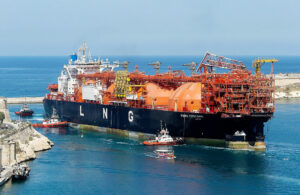THE energy industry asked the Senate to pass a bill easing the process for importing liquefied natural gas (LNG), citing the uncertainty surrounding the gas remaining in the Malampaya field.
Malampaya operator Prime Energy Resources Development B.V. said the energy industry requires a stable framework regulating gas imports to foster growth in power generation.
At a Senate energy committee hearing on Thursday, Prime Energy general manager Donnabel Kuizon-Cruz said: “We can’t really pinpoint an exact date of the Malampaya cutoff. It depends on how we plan our production… We need a bill that would allow companies and government agencies concerned to import gas in an organized way.”
The Malampaya gas field is the country’s only indigenous commercial source of natural gas. It is expected to run out of easily recoverable gas using current techniques by 2027.
In May, President Ferdinand R. Marcos, Jr. renewed Malampaya Service Contract 38 to Feb. 22, 2039, giving operators a 15-year extension beyond the initial Feb. 22, 2024 expiration date.
Malampaya gas accounts for about 20% of Luzon’s electricity requirements.
Senate Bill No. 152, written by Senator Sherwin T. Gatchalian, seeks to develop the midstream natural gas industry, including natural gas transportation and storage.
Senators Rafael T. Tulfo, Emmanuel Joel J. Villanueva, and Maria Imelda Josefa Remedios R. Marcos had filed similar measures seeking to develop the midstream and downstream gas industries, citing the need to maintain a balanced energy mix.
Mr. Gatchalian said LNG is positioned as an aid to the country’s transition to renewable forms of energy.
While a Department of Energy (DoE) circular covers the midstream gas sector, there is no law governing the liquefaction, transportation, and transmission of natural gas, he said.
The bills are part of the common legislative agenda of the Legislative-Executive Development Advisory Council (LEDAC).
Last week, the House of Representatives passed on third and final reading a counterpart bill which includes a provision allowing eligible companies zero-rating on value-added tax (VAT) on natural gas.
Karlo Fermin S. Adriano, Finance Assistant Secretary, said the measure should ensure safeguards are in place to prevent costs from being passed on to consumers.
He noted that proposals for additional tax exemptions for the natural gas industry must also be subject to the Fiscal Incentives Review Board’s oversight.
Mr. Gatchalian at the end of the hearing requested the DoE, First Gen Corp., and Prime Energy to submit position papers to the committee, for discussion by technical working groups.
He also asked the Philippine Competition Commission to provide its views on ensuring healthy competition in the industry.
“Regulating the natural gas industry is a matter of national interest,” Mr. Tulfo said.
“It’s about ensuring that as we transition from indigenous sources like Malampaya to importing of LNG, we have a robust, transparent and efficient system in place.” — John Victor D. Ordoñez

